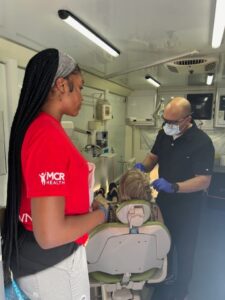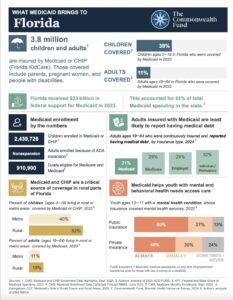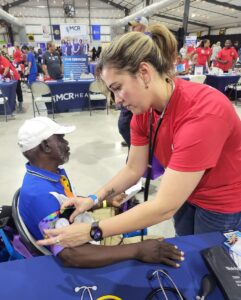Rural areas would be hit especially hard, advocacy group says.
By Johannes Werner
Original Air Date: May 9, 2025
Host: The U.S. Congress is currently discussing shrinking enrollment for Medicaid, the program that covers healthcare for at least 72 million low-income people. If cuts happen, this will have ripple effects not just for patients all the way to Sarasota. It will affect local economies, particularly in rural areas. We talked to an analyst with a think tank that advocates for better healthcare for the most vulnerable Americans.
 Johannes Werner: MCR Health is probably the largest organization in this region taking care of under-insured, low-income people. The non-profit takes care of 100,000 patients in Manatee, Sarasota and DeSoto Counties. And it is currently undergoing bankruptcy restructuring after it ended up being unable to pay its bills last fall. In its bankruptcy filing, the 800-employee organization cites rising rents and damage to its facilities from last year’s hurricanes. And they cited lower mental-health reimbursement rates by Medicaid.
Johannes Werner: MCR Health is probably the largest organization in this region taking care of under-insured, low-income people. The non-profit takes care of 100,000 patients in Manatee, Sarasota and DeSoto Counties. And it is currently undergoing bankruptcy restructuring after it ended up being unable to pay its bills last fall. In its bankruptcy filing, the 800-employee organization cites rising rents and damage to its facilities from last year’s hurricanes. And they cited lower mental-health reimbursement rates by Medicaid.
If and when MCR re-emerges from bankruptcy, it may face an even bigger Medicaid reimbursement challenge. As the Trump administration is pushing for tax cuts and more spending for defense and border security, Republicans in Congress are pushing to add a work requirement and citizenship checks for Medicaid, raising the bar for eligibility. That, in turn, is expected to shrink enrollment by millions of people.
Rachel Nuzum is a senior vice president policy at the Commonwealth Fund. She said she was unable to comment on the specific case of MCR Health, which stands for Manatee County Rural Health. But she did say that organizations like MCR would face tough times.
Rachel Nuzum: Any organization that relies on Medicaid and is serving a safety net population would feel the consequences—very real consequences—if cuts of this magnitude go forward.
No one goes into the Medicaid program to get wealthy and for the money, I think is fair to say. But it is a fair critique—it’s a real critique—that, in many places, the Medicaid reimbursement rates are low. And we know that, when compared to a patient who may not have coverage at all, the facilities are obviously reliant on Medicaid and really prefer having a payer behind the patient than having no payer at all.
JW: Healthcare organizations and jobs particularly in rural areas will be in jeopardy if Congress allows cuts to happen.
 RN: The counties in the areas with the higher rural populations are areas where we know we already have health professional shortages. We also already have workforce issues there. We already have capacity issues with rural hospitals closing. Rural hospitals are highly dependent on Medicaid as a payer. Those areas really also rely on their community health centers, and Medicaid is a major payer for community health centers. The very parts of the system that are on fragile ground right now—the rural hospitals, the ability to find someone who can deliver a baby in a rural area, the ability to get behavioral health care or mental health care or addiction services in rural communities—those are the places that really rely disproportionately on Medicaid. Our expectation is that the cuts would be felt even more severely in those areas.
RN: The counties in the areas with the higher rural populations are areas where we know we already have health professional shortages. We also already have workforce issues there. We already have capacity issues with rural hospitals closing. Rural hospitals are highly dependent on Medicaid as a payer. Those areas really also rely on their community health centers, and Medicaid is a major payer for community health centers. The very parts of the system that are on fragile ground right now—the rural hospitals, the ability to find someone who can deliver a baby in a rural area, the ability to get behavioral health care or mental health care or addiction services in rural communities—those are the places that really rely disproportionately on Medicaid. Our expectation is that the cuts would be felt even more severely in those areas.
JW: The economic effects are not just limited to doctors and nurses. Healthcare organizations employ all kinds of workers. Add to that reduced spending by patients who do not get care, and you are talking about economic cascade effects.
In a scenario of a $880 billion cut to Medicaid spending, Florida stands to lose thousands of jobs, Nuzum says.
RN: We also know, because of the modeling that we’ve done, if we take that $880 billion in reductions and we apply it across the country, it could mean more than $3 billion in reduced economic activity for the state of Florida and a loss of more than $177 million in state and local revenue. The other thing I want to point out is Florida is one of the five states with the highest projected job loss under these cuts. About 33,000 jobs could be lost if cuts of this magnitude go into effect.
 In 2023, Florida received $23 billion in federal support for Medicaid. 65% of all Medicaid spending in the state was covered by the federal government. Those dollars coming in support, like I just mentioned, the community health centers, the rural hospitals. When those resources get reduced, these systems—hospitals, health centers—have to meet their bottom line, so they reduce staff. There’s not a lot they can do to kind of control how many people are coming in for services, but where they really have the control is on the staffing. The systems will be looking to reduce their expenditures. And then what we know is that, once people are losing their jobs, they’re spending less. When they spend less, that’s generating less for the state in terms of state and local tax revenue. So it’s really a cascade effect when federal dollars stop paying for things, especially in a program like this where the states really depend on that math.
In 2023, Florida received $23 billion in federal support for Medicaid. 65% of all Medicaid spending in the state was covered by the federal government. Those dollars coming in support, like I just mentioned, the community health centers, the rural hospitals. When those resources get reduced, these systems—hospitals, health centers—have to meet their bottom line, so they reduce staff. There’s not a lot they can do to kind of control how many people are coming in for services, but where they really have the control is on the staffing. The systems will be looking to reduce their expenditures. And then what we know is that, once people are losing their jobs, they’re spending less. When they spend less, that’s generating less for the state in terms of state and local tax revenue. So it’s really a cascade effect when federal dollars stop paying for things, especially in a program like this where the states really depend on that math.
JW: With shrinking Medicaid programs, there will be more medical debt, and reduced spending by patients, Nuzum suggests.
RN: One piece that often gets missed is how much financial protection Medicaid offers the beneficiaries. We’ve been talking about it as a health program with decades of research showing, when people have access to Medicaid, they’re more likely to access preventative services, which can facilitate earlier diagnoses, better management of chronic conditions. But we also know that it provides protection from medical debt. Those on Medicaid are less likely to report medical debt when compared to those with Medicare or insurance from their employer or individual coverage or coverage on the marketplace. And that’s really important. Especially in Florida, these are very low-income families.
JW: For WSLR News, this has been Johannes Werner.
WSLR News aims to keep the local community informed with our 1/2 hour local news show, quarterly newspaper and social media feeds. The local news broadcast airs on Wednesdays and Fridays at 6pm.